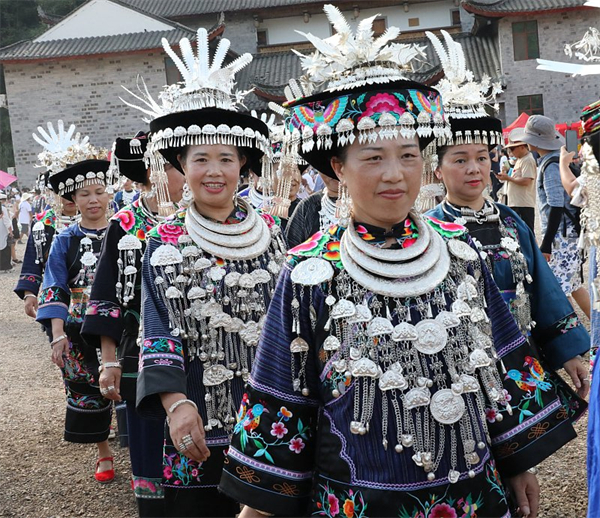The Ganqiu Festival is one of the oldest traditional celebrations and social activities of the Miao ethnic group in China. The festival is not only a way for Miao people to celebrate a bumper harvest, but also a social gathering for young Miao men and women. Over time, some of the traditional cultural activities and sacrificial rituals of the Miao people have been integrated into the Ganqiu Festival, turning it into a large-scale festive occasion. Miao people perform drum dances to celebrate the Ganqiu Festival in Huayuan County, Hunan Province. /CFP Miao people living in Huayuan County, Fenghuang County, Jishou County, Luxi County and several other counties in Hunan Province hold a series of grand ceremonies and activities to celebrate the day. It falls on the first day of "Liqiu," or the "Beginning of Autumn" – the 13th out of the 24 solar terms in Chinese culture – which signifies the end of summer. The festival falls on August 8 this year. Miao people perform dragon dances to celebrate the Ganqiu Festival in Huayuan County, Hunan Province. /CFP The Ganqiu Festival has a long history passed down from generation to generation. According to local folklore, the brave Miao people drove out demons from their lands and began cultivating rice to build up their homeland. And due to their hard work, they were blessed with a harvest every autumn. Since then, the festival has remained a celebration of their victory, gratitude for the harvest season, and a way to send blessings to others. Miao women dress in traditional costumes to celebrate the Ganqiu Festival in Huayuan County, Hunan Province. /CFP During the day, Miao people dress in traditional costumes and gather for a feast featuring vibrant lion or dragon dances, lusheng performances, traditional dancing and singing performances, dramas, martial arts and other fascinating shows and sports activities. Young men and women take advantage of this occasion to meet their loved one. All the people immerse themselves in the lively and passionate atmosphere of the festival, which was enlisted as a national intangible culture in 2014 and inscribed as a UNESCO intangible cultural heritage in 2016.


Ganqiu Festival: Miao People Immersed in Festive Autumn Vibe
Editor:谭婕倪
Source:CGTN
Updated:2023-08-10 14:53:23
Source:CGTN
Updated:2023-08-10 14:53:23
Special
Contact
Welcome to English Channel! Any suggestion, welcome.Tel:0731-82965627
lisl@rednet.cn
zhouqian@rednet.cn











